http://www.blacklistednews.com/The_Libyan_Election_Farce/20434/0/38/38/Y/M.html
and...
http://news.antiwar.com/2012/07/07/libya-election-sees-high-turnout-unrest-from-militias/
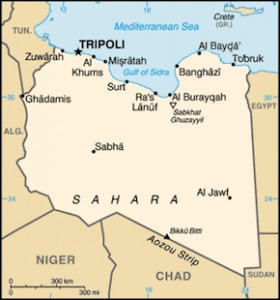 There have been reports of protesters storming a few polling stations in the eastern city of Benghazi and in the eastern town of Rad Lanuf, militias prevented voters from voting. Libyan officials claim that 94 percent of polling stations opened without issue.
There have been reports of protesters storming a few polling stations in the eastern city of Benghazi and in the eastern town of Rad Lanuf, militias prevented voters from voting. Libyan officials claim that 94 percent of polling stations opened without issue.
http://www.juancole.com/2012/07/top-ten-surprises-on-libyas-election-day.html
and....
http://www.libyaherald.com/justice-construction-party-head-concedes-jibril-has-net-lead-in-tripoli-and-benghazi-as-nfa-reportedly-takes-sebratha/
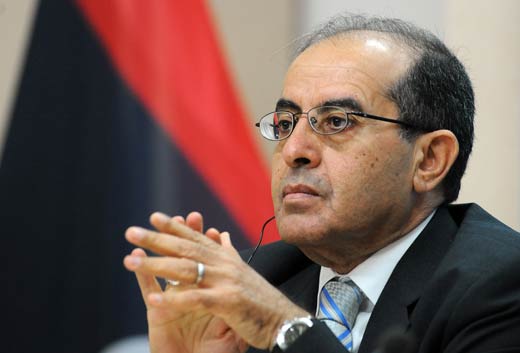
http://www.libyaherald.com/reconciliation-still-some-way-off-as-tawerghans-cast-their-vote/
http://www.libyaherald.com/exclusive-jibrils-national-forces-alliance-looks-set-for-victory/
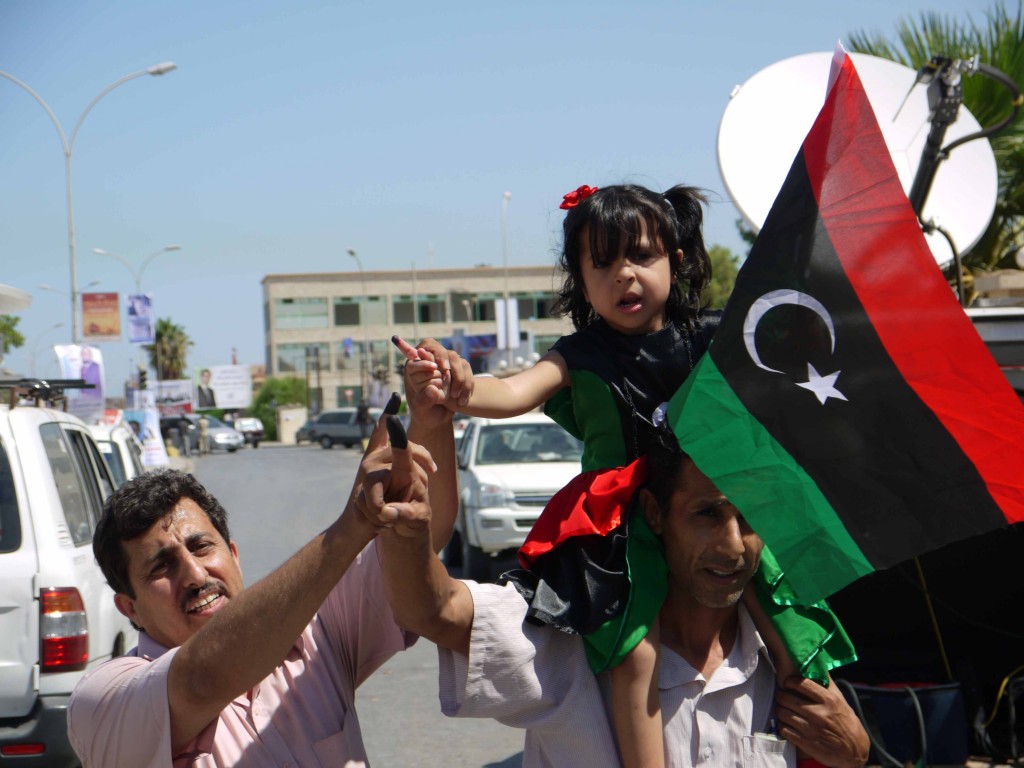
http://www.guardian.co.uk/world/2012/jul/07/libya-elections-polling-raids-vote
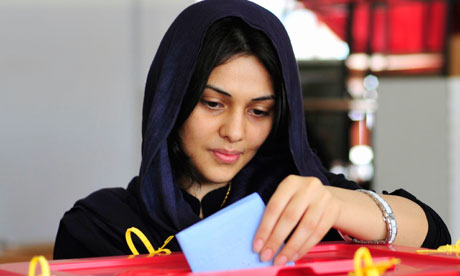
http://www.libyaherald.com/
Elections Special










By Tony Cartalucci
All candidates are neo-imperial candidates - Wall Street proxy Gibril of "National Forces Alliance" presumed winner.
Ideally the West would like to install "liberal" pro-globalist candidates into power in each of the nations it has destabilized and destroyed during its premeditated, engineered "Arab Spring." In the case of Egypt where Mohammed ElBaradei was sufficiently exposed and his presidential aspirations effectively derailed, the West's Muslim Brotherhood proxies made for a viable second option.
In Libya, a similar scenario has unfolded with two tiers of Western proxies poised to take power - pro-globalist technocrats like US-educated Mahmoud Jabril (Gibrill) Elwarfally'sNational Forces Alliance, and of course NATO's terrorist proxies within the Muslim Brotherhood along with Al Qaeda-linked Libyan Islamic Fighting Group (LIFG) warlords likeAbdul Hakim Belhaj.
In Egypt where relative economic and social stability returned after the brief chaos and violence of the early 2011 protests, the alternative media was able to sufficiently expose and disrupt "liberal" candidate ElBaradei. In Libya, the nation has been plunged into nationwide lawlessness, violence, and sweeping genocide by sectarian extremists, tribal confrontations, and militant opportunists. The people of Libya have been too busy defending themselves and desperately fighting for their own immediate survival to function as a nation-state, let alone scrutinize candidates politically before the farcical Western-hyped elections.
In other words, no matter who wins the so-called elections in war-torn Libya, the West has ensured all the candidates are loyal proxies, and will most assuredly have one of these proxies in place to guide Libya according to its own agenda rather than that of the Libyan people.
The New York Times has already proclaimed in its article, "Party Led by Pro-Western Official Claims Lead in Libya," that Jabril's party is the likely winner. Readers might recall that in May of 2011, Jabril had made a pilgrimage back to the United States where he received his higher education and spent years teaching in Pittsburgh, to speak before the corporate-financier funded Brookings Institution (Brookings page here) about turning Libya into a "lake" to develop the skills of Africans to serve the needs of markets in the European Union.
Jibril will serve not as an "elected representative" of the Libyan people, but as a technocratic proxy implementing not only the West's designs for Libya, but carrying out its role in recolonizing and exploiting both the vast populations and resources of the entire African continent. Jibril, or whoever the West finally installs into power will not only carry out this agenda, they will do so under the guise of a "democratic mandate." While impressionable and/or duplicitous people the world over applaud Libya's elections, they are but the most superficial attempt to spin NATO's genocidal destruction of one of the most developed nations in Africa.
And despite these elections, Libya will remain largely lawless and a terrorist safe-haven by design so that it may continue serving its purpose as a weapons, fighter, and cash hub for NATO militant proxies throughout the region, particularly verses Syria.
Libya's "transitional government" led by Western big oil representative Abdurrahim el-Keib had already played a significant role in carrying out Western designs against other geopolitical targets throughout North Africa and the Middle East, including Mali and Syria where Libya has shipped both weapons and fighters to augment NATO-backed terrorists seeking to overthrow these targeted governments. Libya under el-Keib has also lent significant political support to the West's Arab World agenda. Along with the government of Tunisia - led at the time by US funded "activist" Moncef Marzouki, Libya had withdrawn recognition of Syria's government.
What the uninformed public believes it is seeing is a transition to "democracy" across the Arab World and each of these nations joining together to ensure such a transition in remaining "dictatorships." It might be mistakenly believed then that the United States is merely "reacting" to this unfolding paradigm.What has happened in reality is that the so-called "Arab Spring" was planned as early as 2008 with activists literally flown to the United States to receive training, funding, and equipment with which to return to their home countries and begin a campaign of coordinated destabilization. It was under this cover of seemingly legitimate peaceful protesting that more violent elements, organized as early as 2007 or even earlier (as was the case in Libya), began violently overthrowing regimes targeted, according to US Army General Wesley Clark, as early as 1991, with a complete list documented as early as 2001. This list, provided during General Clark's talk at the Commonwealth Club of California, October 3, 2007, included seven nations slated by the Pentagon for destabilization and destruction: Iraq, Syria, Lebanon, Libya Somalia, Sudan, and Iran.
Libya's elections are therefore an absolute farce in the wake of a premeditated Western military campaign aimed at the entire Arab World - the elections a motion gone through to couch the creation of a Western client regime within the perceived legitimacy elections may grant it in the minds of both Libyans and global public opinion.
All candidates are neo-imperial candidates - Wall Street proxy Gibril of "National Forces Alliance" presumed winner.
Ideally the West would like to install "liberal" pro-globalist candidates into power in each of the nations it has destabilized and destroyed during its premeditated, engineered "Arab Spring." In the case of Egypt where Mohammed ElBaradei was sufficiently exposed and his presidential aspirations effectively derailed, the West's Muslim Brotherhood proxies made for a viable second option.
In Libya, a similar scenario has unfolded with two tiers of Western proxies poised to take power - pro-globalist technocrats like US-educated Mahmoud Jabril (Gibrill) Elwarfally'sNational Forces Alliance, and of course NATO's terrorist proxies within the Muslim Brotherhood along with Al Qaeda-linked Libyan Islamic Fighting Group (LIFG) warlords likeAbdul Hakim Belhaj.
In Egypt where relative economic and social stability returned after the brief chaos and violence of the early 2011 protests, the alternative media was able to sufficiently expose and disrupt "liberal" candidate ElBaradei. In Libya, the nation has been plunged into nationwide lawlessness, violence, and sweeping genocide by sectarian extremists, tribal confrontations, and militant opportunists. The people of Libya have been too busy defending themselves and desperately fighting for their own immediate survival to function as a nation-state, let alone scrutinize candidates politically before the farcical Western-hyped elections.
In other words, no matter who wins the so-called elections in war-torn Libya, the West has ensured all the candidates are loyal proxies, and will most assuredly have one of these proxies in place to guide Libya according to its own agenda rather than that of the Libyan people.
Image: Mahmoud Elwarfally Jabril, self-proclaimed leader of the Libyan “Transitional National Council” speaks before the corporate-financier funded Brookings Institution, moderated by former CIA analyst Kenneth Pollack. Jabril maintained that the rebellion against Qaddafi was a natural product of the “globalizational process.” He plans on turning Libya into a "lake" within which the population of all of Africa can be marshaled to meet Europe's markets - or in other words, recolonized.
....
The New York Times has already proclaimed in its article, "Party Led by Pro-Western Official Claims Lead in Libya," that Jabril's party is the likely winner. Readers might recall that in May of 2011, Jabril had made a pilgrimage back to the United States where he received his higher education and spent years teaching in Pittsburgh, to speak before the corporate-financier funded Brookings Institution (Brookings page here) about turning Libya into a "lake" to develop the skills of Africans to serve the needs of markets in the European Union.
Jibril will serve not as an "elected representative" of the Libyan people, but as a technocratic proxy implementing not only the West's designs for Libya, but carrying out its role in recolonizing and exploiting both the vast populations and resources of the entire African continent. Jibril, or whoever the West finally installs into power will not only carry out this agenda, they will do so under the guise of a "democratic mandate." While impressionable and/or duplicitous people the world over applaud Libya's elections, they are but the most superficial attempt to spin NATO's genocidal destruction of one of the most developed nations in Africa.
And despite these elections, Libya will remain largely lawless and a terrorist safe-haven by design so that it may continue serving its purpose as a weapons, fighter, and cash hub for NATO militant proxies throughout the region, particularly verses Syria.
Libya's "transitional government" led by Western big oil representative Abdurrahim el-Keib had already played a significant role in carrying out Western designs against other geopolitical targets throughout North Africa and the Middle East, including Mali and Syria where Libya has shipped both weapons and fighters to augment NATO-backed terrorists seeking to overthrow these targeted governments. Libya under el-Keib has also lent significant political support to the West's Arab World agenda. Along with the government of Tunisia - led at the time by US funded "activist" Moncef Marzouki, Libya had withdrawn recognition of Syria's government.
What the uninformed public believes it is seeing is a transition to "democracy" across the Arab World and each of these nations joining together to ensure such a transition in remaining "dictatorships." It might be mistakenly believed then that the United States is merely "reacting" to this unfolding paradigm.What has happened in reality is that the so-called "Arab Spring" was planned as early as 2008 with activists literally flown to the United States to receive training, funding, and equipment with which to return to their home countries and begin a campaign of coordinated destabilization. It was under this cover of seemingly legitimate peaceful protesting that more violent elements, organized as early as 2007 or even earlier (as was the case in Libya), began violently overthrowing regimes targeted, according to US Army General Wesley Clark, as early as 1991, with a complete list documented as early as 2001. This list, provided during General Clark's talk at the Commonwealth Club of California, October 3, 2007, included seven nations slated by the Pentagon for destabilization and destruction: Iraq, Syria, Lebanon, Libya Somalia, Sudan, and Iran.
Libya's elections are therefore an absolute farce in the wake of a premeditated Western military campaign aimed at the entire Arab World - the elections a motion gone through to couch the creation of a Western client regime within the perceived legitimacy elections may grant it in the minds of both Libyans and global public opinion.
and...
http://news.antiwar.com/2012/07/07/libya-election-sees-high-turnout-unrest-from-militias/
Libya Election Sees High Turnout, Unrest From Militias
Many are depicting the election as a democratic success, but as post-invasion Iraq proved, elections mean very little by themselves
by John Glaser, July 07, 2012
Libya’s first election in six decades reportedly had a high voter turnout, but the day was plagued by still-formed rebel militias committing acts of violence and sabotage and preventing over 100 polling stations from opening.
 There have been reports of protesters storming a few polling stations in the eastern city of Benghazi and in the eastern town of Rad Lanuf, militias prevented voters from voting. Libyan officials claim that 94 percent of polling stations opened without issue.
There have been reports of protesters storming a few polling stations in the eastern city of Benghazi and in the eastern town of Rad Lanuf, militias prevented voters from voting. Libyan officials claim that 94 percent of polling stations opened without issue.
According to the Associated Press, there are about 3,700 candidates seeking election in Libya’s future government, including 585 women. The main parties include the “Muslim Brotherhood (Islamists), Al-Watan (Salafis and other Islamists), Alliance of National Forces (secular), National Front (veteran opposition to Gadhafi), National Centrist (former Finance Minister Ali Tarhouni).”
Results are expected within a week of the voting. Following that a new Assembly is supposed to appoint a Cabinet within 30 days and then a second election for a 60-member body to write a new constitution.
Many in the Western media have been hailing today as an historic day for democracy. But post-NATO Libya is far from a success story. And as Dan Murphy at the Christian Science Monitor writes, “an election by itself means very little, and is certainly no guarantee against horror and chaos in the near future.”
“Iraq’s first free election in history in January of 2005,” Murphy writes, “came as it descended into a civil war that reshaped the demographics of the country and left hundreds of thousands dead in its wake. That country’s ancient Christian population is a fraction of what it was in 2003, and the Islamist government of Prime Minister Nouri al-Maliki has taken on an increasingly authoritarian cast.”
and....
Top Ten Surprises on Libya’s Election Day
Posted on 07/08/2012 by Juan
Most Western reporting on Libya is colored by what is in my view a combination of extreme pessimism and sensationalism. It has been suggested that because most reporters don’t stay there for that long, many don’t have a sense of proportion. It is frustrating to have faction-fighting in distant Kufra in the far south color our image of the whole country. Tripoli, a major city of over 2.2 million (think Houston), is not like little distant Kufra, population 60,000 (think Broken Arrow, OK)!
In the run-up to the elections held on Saturday, a lot of the headlines read ‘Libya votes, on the brink’ or had ‘Chaos’ in the title. But actually, as the Libya Herald reports, the election went very, very well (which did not surprise me after my visit to three major cities there in May-June). The NYT post-election headline of ‘Libyans risk violence to vote’ is frankly ridiculous; in most of the country that simply was not true, though it was true in parts of Benghazi. Even then, how many people died in violence in this election? I count two, but in any case it is a small number. In Tripoli, the election was described as a big family wedding, with lots of loud celebration and tears of joy. Here are the top ten surprises of the election for Libya watchers:
1. Turnout was about 60%, with 1.6 million casting their ballots. This high turnout is especially impressive given how confusing the election procedures were, with 3,000 candidates and only 80 seats out of 200 set aside for political parties (most new formed and not well known).
2. There was relatively little election violence, certainly compared to South Asia, where election day often entails dozens, sometimes hundreds, of deaths. The Libya Herald piece quotes the High Electoral Commission as saying, “…of 1,554 polling centres across the country, 24 were unable to operate, including two in Kufra, six in Sidra and eight in Benghazi.”
3. The remnants of Qaddafi supporters made no trouble, and many went to vote enthusiastically. One of the many wrong predictions made last year by opponents of the revolution was that after it was over, there would be an Iraq-style pro-Qaddafi resistance. It turns out that Qaddafi wasn’t actually popular, and now that he is gone no one is interested in making trouble in his name.
4. One of the last cities to fall to the revolutionaries was Bani Walid, and it was alleged for a long time after the revolution to be in the hands of Qaddafi loyalists. This allegation was always a vast exaggeration. There were only a few militiamen there, who made demonstrations downtown. In fact, if anything, it was the revolutionary militias that controlled a city that somewhat resented them because of their high-handedness. Luke Harding of The Guardian, who bothered actually to go to Bani Walid, found people there as excited about the elections as elsewhere, and eager to combat their city’s reputation as a refuge of former regime loyalists. 46,000 had registered to vote, out of 85,000 inhabitants– i.e. most of those eligible to vote must have registered.
5. The formerly upscale city of Sirte, which had been seen by the revolutionaries as favored by Qaddafi, and near which he made his last stand, decided not to boycott the vote after all, according both to Agence France Press and to the following:
Rena Netjes @RenaNetjes
Corresp alHurraTV in #Sirte: “Turnout 70%, women 35-40%. Ppl very very happy to be able to vote for the 1st time” #Lyelect.There are genuine resentments toward Sirte on the part of the revolutionary cities, and locals complain about discrimination of various sorts. They clearly feel that being well represented in the new parliament is a way of gaining a voice and being reintegrated into the new Libya. It was places like Bani Walid and Sirte from which trouble on election day had been expected, and it did not happen.6. The Muslim fundamentalist parties that were expected to dominate the new parliament may not do so. First of all, only 80 of the 200 seats are allocated to parties, and the liberal party of former head of Qaddafi’s National Economic Development Board, Mahmoud Jibril, is said to be doing well in early returns and exit polls. Because of the large number of independents and uncertainty with whom they will caucus, predictions about the shape of the government are premature. The West is more secular than the east or the south. In Libya, the remnants of the old regime are called ‘seaweed’ or ‘algae’ (tahallub), i.e. the flotsam left behind when the tide recedes. As in Tunisia and Egypt, there has been a lot of debate around what to do with them. They often have a lot of money, and are regrouping to succeed in the new system. Since a lot of prominent Libyan technocrats had been lured back to the country in the past decade, with Qaddafi’s and his son Saif al-Islam’s attempt to open to the West, leaders like Mahmoud Jibril (al-Warfalli) are considered by some to be leftovers, while others see him as someone who went over to the revolution and served as its first transitional prime minister.7. Despite the faction-fighting that has plagued some desert cities, such as Zintan and Kufra, the Fezzan region of Libya– its third traditional region after Tripolitania and Cyrenaica– went to the polls quietly and peaceably for the most part. Two of the polling stations in feud-ridden Kufra could not open because of tension. Here’s what my Fezzan twitter feed looked like:
“Women crowds in Zintan for voting …
9:16 AM – 7 Jul 12 via Twitter for iPhone ·
22h Libya.elHurra Libya.elHurra @FreeBenghaziJuly7: Election observers at a Zintan polling station. Reports of good turnout from women but no pics yet #Libya20h AC Tripolis AC Tripolis @david_bachmann_
Very big crowd in front of voting room for people from #Ghadames – quite noisy, but relaxed #LyElect #gheryan #Libya”8. A big surprise is that what little election day trouble there was came from the East, from the center of the revolution. Thus, small crowds or small militia contingents attacked or tried to attack polling stations in Ajdabiya, Sidra, Ras Lanouf and Benghazi itself. But aside from a few stations in Sidra and 8 in Benghazi, all of them reopened and some stayed open till midnight to make up for having been closed in the morning. In one incident in Benghazi, pro-election crowds actually drove off a group of states’ rights protesters who want decentralization.9. Women registered to vote, ran for office, and went to the polling stations in surprisingly high numbers. In some small cities, eyewitnesses thought the women’s lines were much longer than those of the men.10. Among this generation of Libyans, democracy is really, really popular.
http://www.libyaherald.com/justice-construction-party-head-concedes-jibril-has-net-lead-in-tripoli-and-benghazi-as-nfa-reportedly-takes-sebratha/
Justice & Construction Party head concedes Jibril has ‘net lead’ in Tripoli and Benghazi as NFA reportedly takes Sebratha
By Hadi Fornaji,
Benghazi, 8 July:

Predictions are growing that Jibril’s NFA will win the largest number of seats in the National Conference (Photo: France24)
Mahmoud Jibril’s National Forces Alliance has a ‘net lead’ in Tripoli and Benghazi, according to the leader of one of the coalition’s biggest rivals.
Mohammed Sewan, who leads the Muslim Brotherhood-aligned Justice & Construction party, made the concession earlier today. “The National Forces Alliance achieved good results in some large cities except Misrata. They have a net lead in Tripoli and Benghazi”.
The assessment conforms with the Libya Herald’s own predictions of a NFA victory, which the paper made last night.
In the past few hours, vote counters in Sebratha, a sizeable town to the west of Tripoli, confirmed unofficially to the Libya Herald that the NFA had secured the most votes. The female vote was reportedly the deciding factor, with women coming out in large numbers in favour of Jibril.
As home to some of Libya’s most spectacular Roman ruins, it is also believed that the NFA’s positive reputation for economic openness may have swayed many voters hoping to see Sebratha become a tourist destination.
It has also been reported that major parties including the Nation Party and the National Front failed to pick up a single vote at some polling stations in the town.
Speaking to the news agency AFP earlier today, NFA Secretary General Faisal Krekshi confirmed that he too believed the NFA was on course for victory. “Early reports show that the coalition is leading the polls in the majority of constituencies”, he said.
Should the NFA prevail, there is the added question of which parties, if any, the coalition will choose to work with to form a government. A Libya Herald source at the coalition confirmed that preliminary discussions were being held with the Justice & Construction Party, who are also predicted to do well.
An additional determining factor will be the extent to which individual candidates choose to congregate around the political parties after the elections. Individual candidates will collectively hold 120 seats in the National Conference, as against the political parties’ 80.
http://www.libyaherald.com/reconciliation-still-some-way-off-as-tawerghans-cast-their-vote/
Reconciliation still some way off as Tawerghans cast their vote
By George Grant.
Benghazi, 7 July:
At a makeshift camp in a cement factory five miles out of Benghazi, a small group of Tawerghan refugees gather to cast their vote.
Compared with the scenes of jubilation being witnessed elsewhere in Libya, the mood here is decidedly subdued. A tattered UNICEF tent stands empty in the middle of the complex, whilst young men languish next to stalls selling food, cleaning products and other necessities nearby.
The 2,600 members of the camp were brought here last October by Benghazi revolutionaries who rescued them from Kufra, where they had fled following the collapse of Muammar Qaddafi’s regime.
Now, with the opportunity to vote, some of the camp’s occupants are hoping their fortunes may start to change.
“God willing, this election will make a difference”, said Salem Mohammed Ashour, a retired soldier who had just cast his vote. “Tawergha has some candidates standing and we hope they will be elected so they can explain our situation”.
At present, the situation of the country’s Tawerghans is far from sanguine, and the group must rank amongst the most reviled in all Libya.
During the war, Tawerghans were accused of committing horrendous crimes for the regime against the nearby city of Misrata, with instances of rape, looting and murder reported on a widespread scale.
Since then, Misratans have exacted collective punishment, forcing almost all of the 30,000 occupants of Tawergha to flee and burning the town to the ground. Many thousands are now being held in detention centres and camps across Libya, where instances of mistreatment and neglect are widespread.
A Tawerghan prepares to cast his vote. Photograph: George Grant
Tawergha has four candidates standing in these elections, ironically as part of the Misrata constituency, and the camp’s residents say they will be voting for them and them alone.
“We want to help move this country forwards, and for Libya to understand that we are just ordinary people”, said Salem Ali, a spokesman for the Tawerghans who visits the camp every day. “We are talking to the government a lot, but they aren’t listening to us”.
Unfortunately, reconciliation between Tawerghans and other Libyans still seems a long way off. Viewed as murderers, rapists and Qaddafi loyalists by most of their fellow countrymen, bitterness continues to run deep on both sides.
“Many people will not be voting today”, Ali continues. Some of the women who’s husbands are still detained are boycotting the elections, and I myself am too angry to have considered standing as a candidate. We knew what it was like under Qaddafi, but we never imagined it could be worse for us in the new Libya”.
More than anything else, Tawerghans here say they now just want to return to their homes. “We don’t care if Tawergha has been burned down”, says one. “We will live under the trees if necessary”.
At present, such talk sounds like dreaming. A return to Tawergha would almost certainly risk further recriminatory violence, and here at least they are clean and safe. Most of the children are in schools and the biggest danger for the camp’s adult residents is ideleness, a fate that currently seems impossible to avoid.
With just 400 of the camp’s 1,400 registered electors having voted by the early part of this afternoon, it is also far from certain whether any Tawerghan candidates will be elected, still less how effective they will be in the new National Conference if they do succeed.
An effective justice and reconciliation process is badly needed for the Tawerghan problem, as it is for many other unresolved conflicts in the new Libya. With the transitional authorities having failed to put such a process in place, it will now be up to the new government to have the courage to take that initiative.
As things currently stand, the residents of this camp look set to be here for a good while longer yet.
http://www.libyaherald.com/exclusive-jibrils-national-forces-alliance-looks-set-for-victory/
EXCLUSIVE: Jibril’s National Forces Alliance looks set for victory
By George Grant and Michel Cousins.
Benghazi and Tripoli:

An aspiring young voter comes prepared for the cameras outside a polling station in Benghazi today. Photograph: George Grant
Mahmoud Jibril’s National Forces Alliance (NFA) looks set for victory in Libya’s historic National Conference elections, the Libya Herald can reveal.
Early indications from both Tripoli and Benghazi suggest the NFA is comfortably ahead of any of its 130 rivals, including major contenders such as the Justice & Construction Party, the Nation Party and the National Front.
In spite of early disruptions in eastern Libya, voter turnout was high. Late today, HNEC head Nuri Al-Abbar said total voter turnout was 60 per cent, with 1.6 million of Libya’s 2.8 million electors having cast their vote. He added that out of a total of 1,554 polling centres across the country, 24 were unable to operate, including two in Kufra, six in Sidra and eight in Benghazi.
Initial suggestions of an NFA victory emerged from a series of unofficialLibya Herald exit polls conducted at various polling centres in Libya’s two largest cities over the course of the day.
This evening, the Libya Herald observed vote counters at the Hurriya (Freedom) voting station in Benghazi, with many if not the majority of votes appearing to be for Jibril’s coalition.
A senior official at the HNEC in Tripoli subsequently confirmed that his indicators also suggested that the NFA was out in front. “From what I’m hearing now, it does appear that Jibril is going to do the best”, the official said.
In Tripoli’s Martyrs Square, voters celebrate the election late into the night (Photo: Rida Aghil)
One young NFA supporter queuing to buy ice cream in the Suq Al-Juma district of Tripoli today said that she had spoken to at least 50 of her friends, with “all planning to vote for Jibril’s alliance”.
“I feel that he’s not like other politicians”, said Musab Al-Majjub, a businessman from Misrata now living in the capital. “I trust him. I think he will be able to unite all Libyans”.
However, an NFA victory would not please all Libyans. Yesterday the Libya Herald was contacted by a prominent Libyan politician who claimed that former revolutionaries had been meeting across Libya over the past few days to discuss possible action should Jibril win. He said that they had decided that action would be taken on the grounds that a victory for him would be a “theft of their revolution”.
Jibril, who served as head of the National Economic Development Board under Qaddafi, cut a controversial figure as head of the NTC’s executive office during last year’s revolution. Some Libyans believe that his past ties to the Qaddafi regime make him an unsuitable figure to lead the new Libya.
Jibril has also been denounced as an “extreme secularist”, by the prominent cleric Ali Salabi, although he has repeatedly denied this. The NFA is nonetheless seen as at the more pragmatic end of Libya’s political spectrum, especially when compared with more avowedly Islamist groups such as the Justice & Construction Party.
Deputy Prime Minister Mustafa Abushagur is just one in a crowd of thousands in Martyrs Square who voted today (Photo: Rida Aghil)
Even if the NFA do prevail, however, this does not necessarily mean it will hold the balance of power in the National Conference. Libya’s complicated voting system has been deliberately designed to prevent an outright majority being obtained by any one party, with parties only in contention for 80 of the Conference’s 200 seats.
The remaining 120 seats are reserved for individual candidates, who remain the great unknown of this election. Although clear favourites were emerging in some constituencies over the course of the day, the agendas of many remain unclear.
The extent to which the winners of individual seats choose to congregate around the major political parties in the National Conference could in fact be the most important factor in determining who wields real control after the elections.
http://www.guardian.co.uk/world/2012/jul/07/libya-elections-polling-raids-vote
Libya elections: polling station raids mar first vote since Gaddafi's death
Libyans turn out in their millions for first national ballot since 1964 despite efforts by federalists to disrupt polls

A voter registers her choice in Benghazi. Photograph: Esam Omran Al-Fetori/Reuters
Federalists in eastern Libya attacked several polling stations on Saturday as the country voted in the historic first election since last year's revolution and the death of Muammar Gaddafi.
Although voting took place peacefully across much of the country, armed gangs in Benghazi stormed a polling station and burned ballot papers. Two other polling stations were attacked, with one man shot in the arm. There were similar incidents in the eastern coastal towns of Guba and Suluq, where fighters stopped ballot papers being delivered.
However, in the capital, Tripoli, and other cities thousands queued from 8am to vote, the overwhelming majority for the first time.
Libya's last election took place in 1964 under King Idris al-Senussi, the monarch Gaddafi ousted five years later.
Many residents were overwhelmed at the opportunity to vote. "I'm so excited. I woke up at six this morning, before my daughters," said Mabroka Amar, 69, at a polling station in Tripoli. She said that she dimly remembered last voting almost half a century ago, adding: "A new country has been born. God willing, I will be alive to vote again and again."
The mood across the capital was festive. Residents waved the red, black and green revolutionary colours and honked their car horns. Several hundred gathered at Martyrs' Square, in the centre of the city, and kissed the ground. Others posted photographs of their fingers – dyed purple by officials after voting – on Facebook. One jokey doctored version showed the late Gaddafi also voting.
Many said that the idea of taking part in an election had previously been little more than fantasy, with Gaddafi a vehement opponent of parliamentary democracy. "I'm 35 years old. I've never voted. The devil was with us from 1969. This is like the first man on the moon," said Ali Ilhouri at Tripoli's Allassma high school, which was serving as a polling station.
He dismissed the federalist protesters in Benghazi and eastern Libya as a relatively small group of "mad fanatics". He said: "I was born in Benghazi. There are lots of other peaceful ways to protest in this election. It isn't civilised."
The federalists are deeply unhappy at the distribution of seats in the new national congress. The outgoing National Transitional Council allocated seats on the basis of population numbers, with 100 going to the west, 60 to the east and 40 to the south. The federalists say that the regions should have a third each.
The revolution has reignited Benghazi's long-standing feelings of marginalisation and injustice, fuelled by the city being the first to rise up against Gaddafi on 17 February last year.
On Friday, armed groups shut several important eastern oil terminals in protest. They also used anti-aircraft guns to fire on a helicopter carrying election materials, forcing it to land and killing a 22-year-old election volunteer.
"The country will be in a state of paralysis from now on because no one in the government is listening to us," Hamed al-Hassi, a defiant former rebel who now heads the high military council of Cyrenaica, the name for the eastern region, told Reuters.
The national election commission in Tripoli admitted that some election material had been "destroyed" in Benghazi. But it said that polling had gone ahead in 94% of voting centres – 1,453 out of 1,554 – with officials trying to deliver new ballot papers where the security situation allowed.
Against expectations, voting was a success across the south, it said, including in the remote south-eastern town of Kufra, the scene of vicious fighting between Arab Zuwayy and black Toubou forces. Two polling stations for Toubou were functioning, although two in Kufra had not functioned, he said, after local Toubou leaders "refused to receive" elections materials.
Libya's election commission chairman, Nuri al-Abbar, said all but seven polling stations had managed to open, despite sporadic federalist violence in the east of the country.
"The election has gone on in a very positive manner, much more than we expected," he said, adding that around 1.2 million out of 2.8 million registered voters had cast their ballot by mid-afternoon.
A spokesman for the interior ministry, Araaf al-Hoja, admitted that it was hard to stop federalist gunmen from "violating" polling stations. "Unfortunately we know many people have weapons," he said. "But overall the security situation is very good."
Western leaders praised the election, with the US senator John McCain on a visit to Tripoli, and British foreign secretary William Hague tweeting enthusiastically that the vote was a "historic moment and achievement after much suffering".
Results will not be known for several days. The Muslim Brotherhood's Justice and Development party is expected to do well, with some predicting that Islamists will sweep to power, as they have done in post-Arab spring elections in neighbouring Tunisia and Egypt.
On Saturday, however, many voters said that they had instead supported Mahmoud Jibril, a pragmatic moderate and Libya's former interim prime minister until his resignation in October. His National Forces Alliance appears to enjoy broad appeal.
http://www.libyaherald.com/
Elections Special
Voters vote early
By Umar Khan. Tripoli, 7 July: More than 100 voters were lined up at the gates of one polling station in Janzour from 7am, an hour before the…

Massive election turnout in Tripoli
By Henrik Tessmer and Michel Cousins Tripoli, 7 July: In a sign that holds great promise for the new democracy in Libya, voters started to queue in Tripoli…
Federalists steal ballot papers in Ajdabiya and Brega; delay vote
By George Grant Benghazi, 7 July: Voting in Ajdabiya was being delayed after federalists stole the ballot papers and other election material early this morning. The papers were…

EU team plans election assessment on Monday
By Michel Cousins. Tripoli, 6 July: The EU team that is monitoring and assessing the conduct of tomorrow’s National Congress elections will produce a preliminary report on the…
Elections in Kufra and Ajdabiya will go ahead: Elabbar
Tripoli, 6 July: There will be no postponement of tomorrow’s national elections in either Kufra or Ajdabiya despite local circumstances, the head of the High National Election Commission…
The election at the Tawergha camp in the Janzour Naval Academy
By Ashraf Abdul-Wahab Tripoli, 6 July The Naval Academy in Tripoli’s Janzour district is now also used as a refugees Camp for the displaced Tawerghan families. When…
Elections campaigning ends
By Umar Khan. Tripoli, 6 July: The campaigning for the first elections of Libya in more than four decades ended on Thursday evening with two major parties, the…

NTC decision on Constitutional Commission attacked
By Michel Cousins. Tripoli, 6 July: The head of the of Union for Homeland party, Aburrahman Sewelhi, has attacked the last-minute decision by the NTC to remove responsibility…

Election security parade in Tripoli’s Martyrs Square
By Umar Khan. Tripoli, 6 July: Some 35 armoured vehicles took part in a parade in Tripoli’s Martyr Square on Thursday evening organised by the Interior Ministry in…
Federalist violence threatens to backfire following fatal attack on helicopter in Benghazi

By George Grant. Benghazi, 6 July: One man was killed and another wounded outside Benghazi…
Fair trial for Saif “impossible” in Libya, says ICC’s Taylor

Tripoli, 6 July: Melinda Taylor, the recently-freed International Criminal Court (ICC) defence lawyer for Saif…
Human Rights Watch demands fair treatment for Mahmoudi

by Hadi Fornaji Tripoli, 6 July: Human Rights Watch (HRW) has today called for “appropriate…
Federalists halt production at eastern oil terminals

Tripoli, 6 July: Armed Cyrenaica federalists have halted pumping at five oil terminals in the…
Ajdabiya election storage centre burned by suspected federalist arsonists

Tripoli, 5 July: The main storage centre for election materials was burned down by suspected…
Conference by the Civic Affairs Authority on its aims of e-government
By Sami Zaptia. Tripoli, 5 July: The Civic Affairs Authority (part of the Ministry of…
Al-Senussi not in Libya

By Hadi Fornaji. Tripoli, 5 July: Reports in many Libyan news outlets that Qaddafi’s former…
Border security officer assassinated in Benghazi
Benghazi, 5 July: Colonel Sulaiman Hasan Bortima, an officer working for the borders control department…
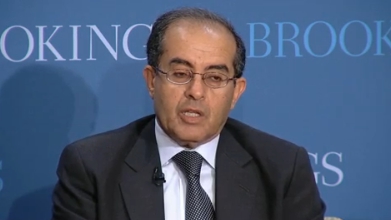
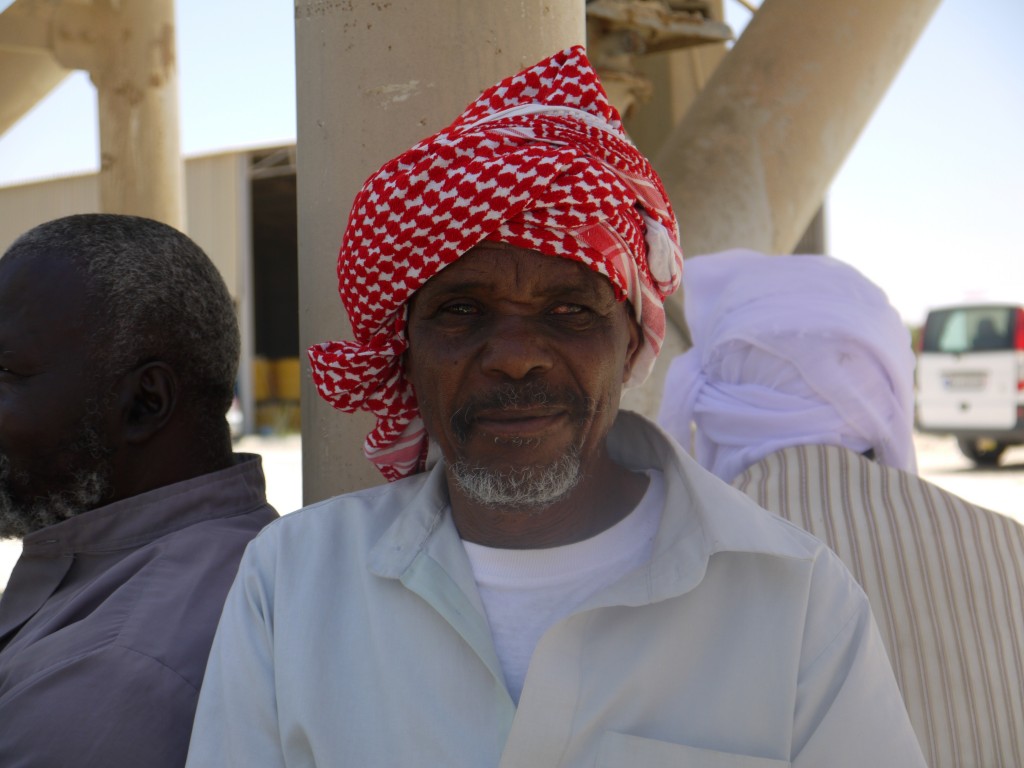
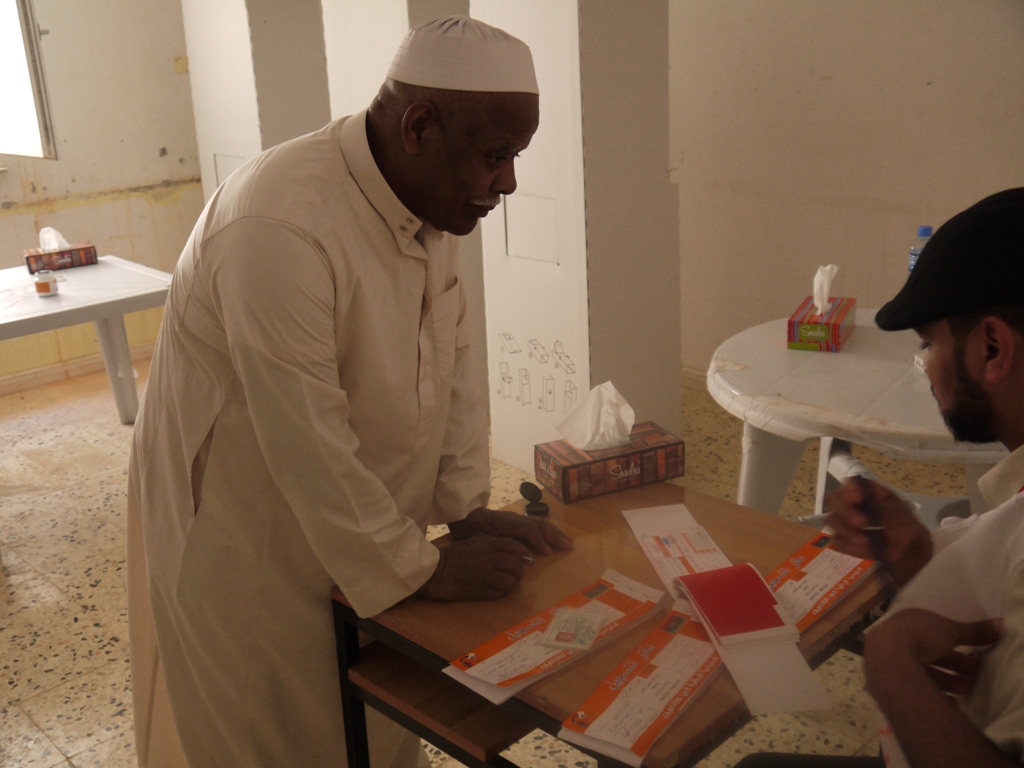
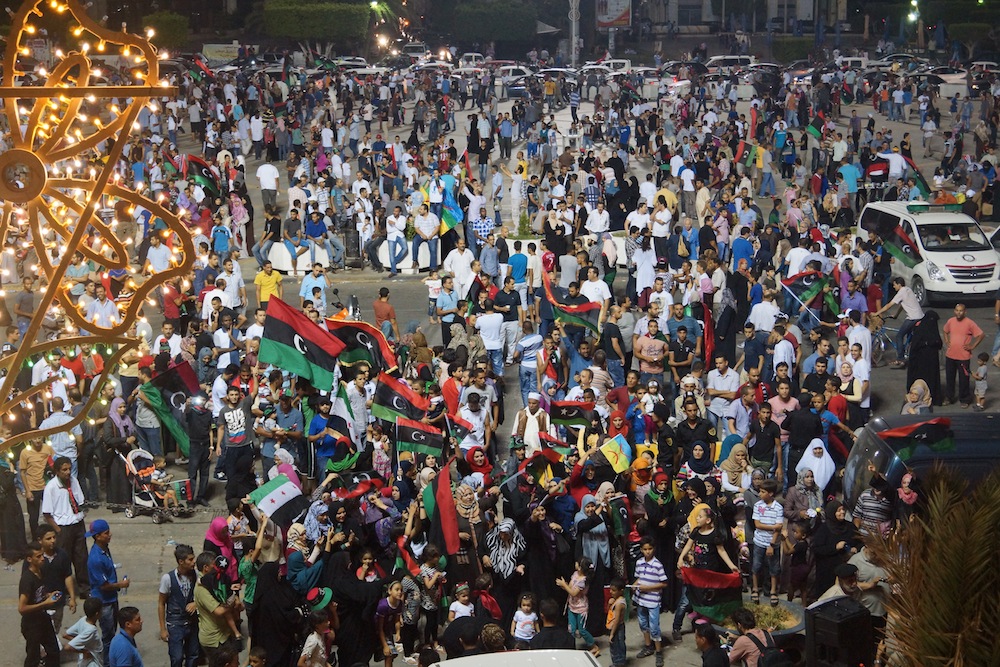
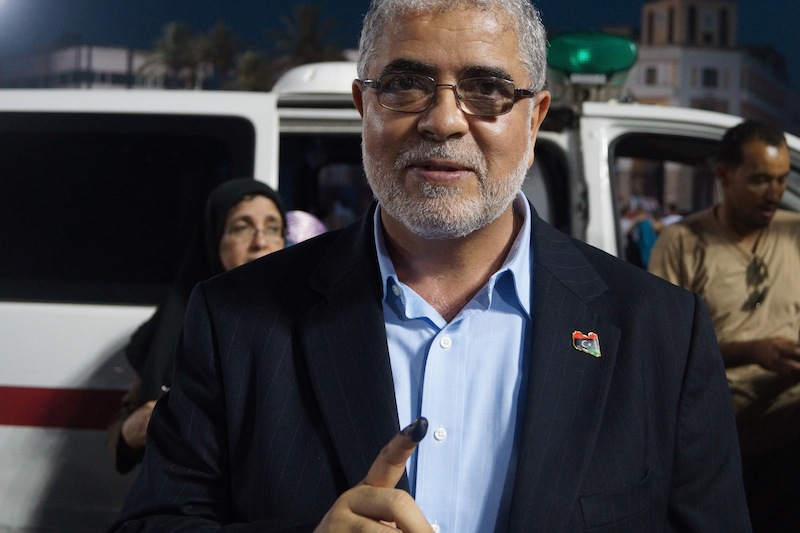
No comments:
Post a Comment